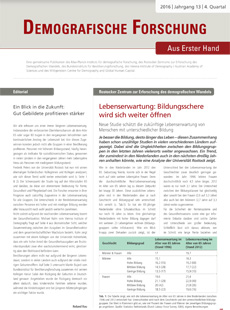December 19, 2016 | Defo News
More people without children or less people with many children?

Issue 04/2016 © MPIDR
The new issue (Nr. 4/2016) of Demografische Forschung Aus Erster Hand, the popular science newsletter with latest research results from demography, has been released. (The Newsletter is available in German only.)
Topics of the 4/2016 issue:
1. Life expectancy: Education gap widens further
New study estimates future life expectancy of people with different education levels
The higher education is, the longer life is. Countless studies conducted in a series of different countries have demonstrated this relationship. Now, in many places disparities between education groups have continued to increase in recent years. This trend could continue for the next thirty years – at least in the Netherlands. This is shown by a study conducted by the University of Rostock.
2. More people without children or less people with many children?
Fertility decline mainly driven by declining numbers of large families
The decline in fertility in the second half of the 20th century has been subject to much discussion and analysis. It is all the more astonishing, then, that disagreement prevails on a key issue: Does the decline in the main reflect rising numbers of childless women? Or can it be attributed to decreasing numbers of large families? A new study conducted by the Federal Institute for Population Research has broken down in detail these effects now for the first time.
3. Healthy growth
Large health sector can promote prosperity
Europeans spend billions on their health. In many countries, the sector thus has become a driving force behind economic growth. But when is this sector so large that it removes too many workers from the economy, thus reducing economic growth? A new study looks at this question and also considers the impact of health care on the life span and duration of working life of people.
"Demografische Forschung Aus Erster Hand" is a joint publication of the Max Planck Institute for demographic Research (MPIDR), the Rostocker Zentrum zur Erforschung des Demografischen Wandels (RZ), the Vienna Institute of Demography (VID), the Wittgenstein Centre for Demography and Global Human Capital and the Federal Institute for Population Research (BiB). The newsletter is released four times a year and is available electronically and as a printed version and is free of charge.
All past issues are available online on the Newsletter website. On the website you also have the possibility to subscribe to the Newsletter to get informed about the release of the new issues or to receive the printed versions by mail.